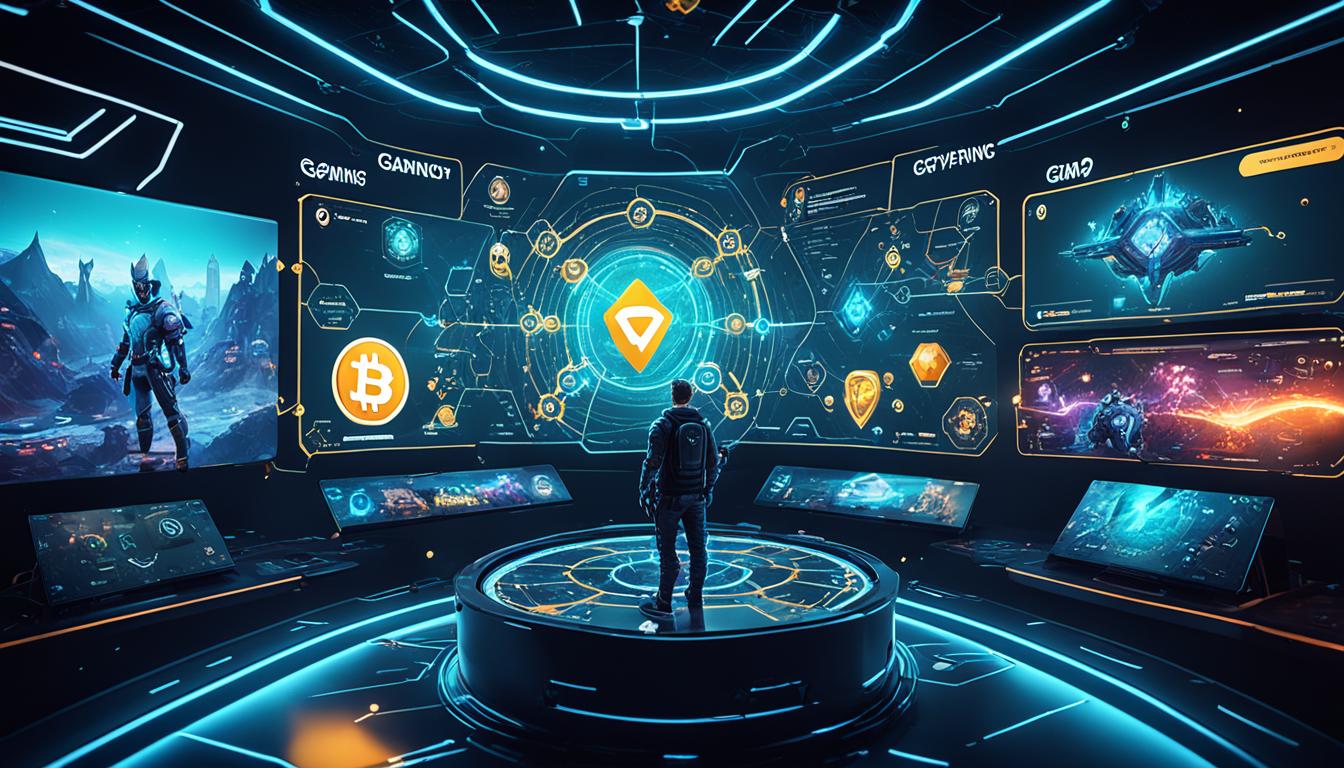Did you know that machine learning is transforming the world of crypto gaming, creating personalized experiences for players? It’s true! As the popularity of non-fungible tokens (NFTs) continues to soar, machine learning algorithms are revolutionizing the way in-game assets are managed and valued.
NFTs have introduced true digital ownership, allowing players to not only collect unique assets but also leverage them as virtual entrepreneurs. With the help of machine learning models, player behavior and market dynamics are analyzed to provide dynamic pricing for in-game assets, ensuring fairness and transparency.
Key Takeaways:
- Machine learning is revolutionizing the world of crypto gaming, personalizing player experiences.
- NFTs have transformed in-game assets, offering players true digital ownership.
- Machine learning models analyze player behavior and market dynamics to provide dynamic pricing for in-game assets.
- The integration of machine learning in crypto gaming is reshaping the gaming industry.
- Personalized player experiences are the future of the gaming industry.
The Role of Machine Learning in Enhancing Player Engagement
Machine learning models in the gaming industry analyze vast datasets and predict player behavior to enhance player engagement. These models adapt to individual player preferences, adjusting game difficulty, rewards, and item availability. They create unique gaming experiences tailored to each player’s style and performance.
Machine learning also assists in generating game levels, characters, and assets, making the gaming world more immersive and varied. AI-driven recommendations based on player preferences help players curate a collection of in-game assets that align with their gaming personality.
“Machine learning has transformed the gaming experience, offering players personalized journeys and promoting deep player engagement. By analyzing player behavior and preferences, machine learning models can adapt games in real-time, enhancing player enjoyment and fostering a sense of connection with the virtual world.”
– Jane Miller, Game Developer
Enhancing Player Engagement through Adaptive Difficulty
One of the key ways in which machine learning enhances player engagement is through adaptive difficulty. Traditional games often present a fixed difficulty level, which may result in players becoming disengaged if the game is either too easy or too challenging. Machine learning models dynamically adjust the game’s difficulty based on the player’s skill level, ensuring a challenging yet enjoyable experience.
For example, if a player consistently performs well and finds the game too easy, the machine learning algorithm can introduce new and more challenging enemies or obstacles to maintain engagement. On the other hand, if a player is struggling with certain aspects of the game, the difficulty can be adjusted to provide more guidance and a smoother progression, preventing frustration and helping the player stay engaged.
Personalized Rewards and Item Availability
Another way in which machine learning enhances player engagement is by offering personalized rewards and item availability. Machine learning models analyze player preferences, playing style, and in-game behavior to determine the types of rewards that resonate most with each player. This could include unlocking exclusive items, granting bonus levels, or providing in-game currency.
Furthermore, machine learning models can tailor the availability of in-game items based on player preferences. For instance, a player who enjoys using certain weapons may have an increased chance of finding those weapons as they progress through the game. This personalization not only increases player engagement but also creates a sense of uniqueness and ownership over the gaming experience.
Generating Immersive and Varied Game Content
Machine learning is also instrumental in generating immersive and varied game content, further enhancing player engagement. These models analyze vast amounts of data on game levels, characters, and assets, learning the patterns and intricacies of successful game design.
By utilizing this knowledge, machine learning algorithms can generate new game levels, characters, and assets that align with player preferences and create fresh experiences. This dynamic content creation keeps players engaged by constantly offering new challenges and surprises, ensuring that their gaming experience remains captivating and exciting.
Curating In-Game Asset Collections
The personalized recommendations driven by machine learning models enable players to curate collections of in-game assets that align with their gaming personality. These recommendations take into account factors such as playstyle, aesthetic preferences, and rarity of assets, providing players with a tailored selection of items to enhance their gameplay and self-expression.
By curating their collections, players can invest in assets that hold personal value and meaning, further deepening their engagement with the game. This aspect of personalization not only enhances player enjoyment but also promotes a sense of individuality and identity within the gaming community.
| Enhancements | Impact on Player Engagement |
|---|---|
| Adaptive Difficulty | Prevents disengagement by tailoring the game’s difficulty to individual player skill level |
| Personalized Rewards and Item Availability | Creates a sense of ownership and exclusivity, motivating players to continue playing and exploring |
| Generating Immersive and Varied Game Content | Offers fresh challenges and surprises, keeping players captivated and eager to continue playing |
| Curating In-Game Asset Collections | Allows players to express their individuality and invest in assets that align with their gaming personality |
Ethical Considerations in Machine Learning in Crypto Gaming
The integration of machine learning in the world of crypto gaming brings forth a set of crucial ethical challenges that demand careful consideration. As AI systems leverage user data to personalize gaming experiences, privacy emerges as a major concern. Developers must prioritize transparent data usage practices and implement robust data protection measures to safeguard players’ sensitive information.
Moreover, ensuring the security of players’ personal information and assets from potential threats becomes paramount. As the gaming industry relies on blockchain technology and decentralized platforms, it is crucial to establish and maintain a robust security framework to protect players’ valuable assets from unauthorized access or malicious attacks.
Furthermore, developers must be cognizant of the content generated by AI models, ensuring it does not inadvertently promote harmful stereotypes or actions. Responsible AI deployment and content moderation become pivotal in maintaining a healthy and inclusive gaming environment.
Striking the delicate balance between personalization and privacy is crucial for sustaining trust within the crypto gaming community. By upholding ethical standards and fostering transparency, developers can not only enhance player experiences but also create a gaming landscape that is fair, inclusive, and respectful.

“The integration of machine learning in crypto gaming brings forth a set of crucial ethical challenges that demand careful consideration.”
Conclusion
Machine learning has revolutionized the gaming industry, ushering in a new era of personalized player experiences in the world of crypto gaming. Through the integration of AI, gaming companies have been able to reshape in-game assets, adapt difficulty levels, and offer personalized recommendations, enhancing player engagement.
The future of the industry looks even more promising with emerging trends such as generative AI, cloud-based gaming, NFTs, AR and VR advancements, and voice and audio recognition. These advancements will further elevate the gaming experience, creating immersive worlds and tailored gameplay for players worldwide.
With the continuous evolution of AI, the gaming industry is expected to witness remarkable advancements, leveraging machine learning to provide dynamic and unique gaming experiences that appeal to individual player preferences. As the crypto gaming market grows, the role of machine learning becomes even more vital in shaping the future of the industry, pushing boundaries and unlocking new possibilities.
FAQ
What is the role of machine learning in NFT gaming?
How do machine learning models enhance player engagement in the gaming industry?
What ethical considerations are associated with the integration of machine learning in crypto gaming?
What are the future trends of machine learning in crypto gaming?
Source Links
- https://www.aiacceleratorinstitute.com/artificial-intelligence-in-gaming-revolutionizing-the-player-experience/
- https://medium.com/coinmonks/nft-gaming-revolution-role-of-machine-learning-in-nft-gaming-assets-bd3e90e4cbe2
- https://www.linkedin.com/pulse/enhancing-gaming-experiences-through-artificial-intelligence-d-9ssrc

Leave a Reply